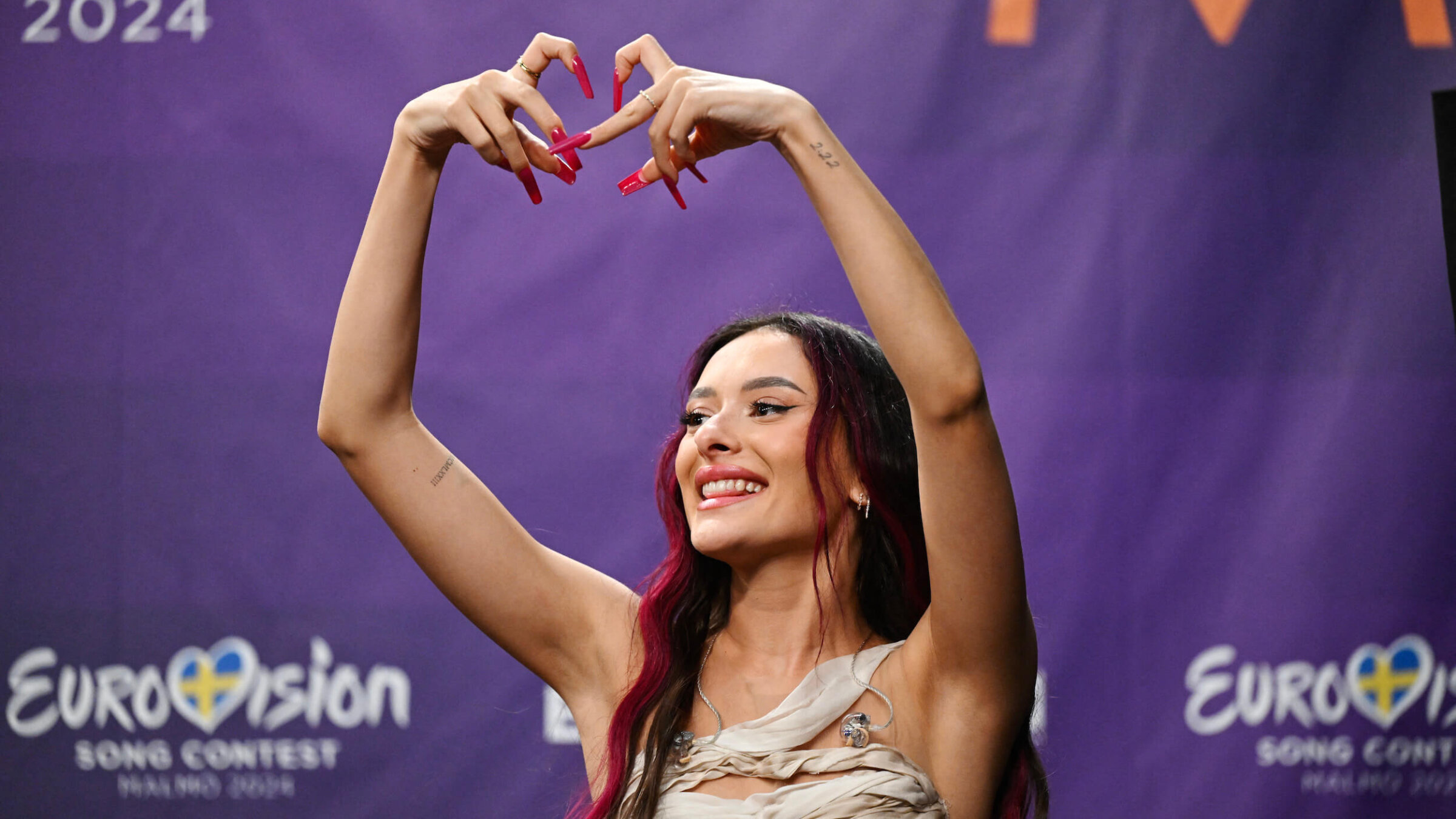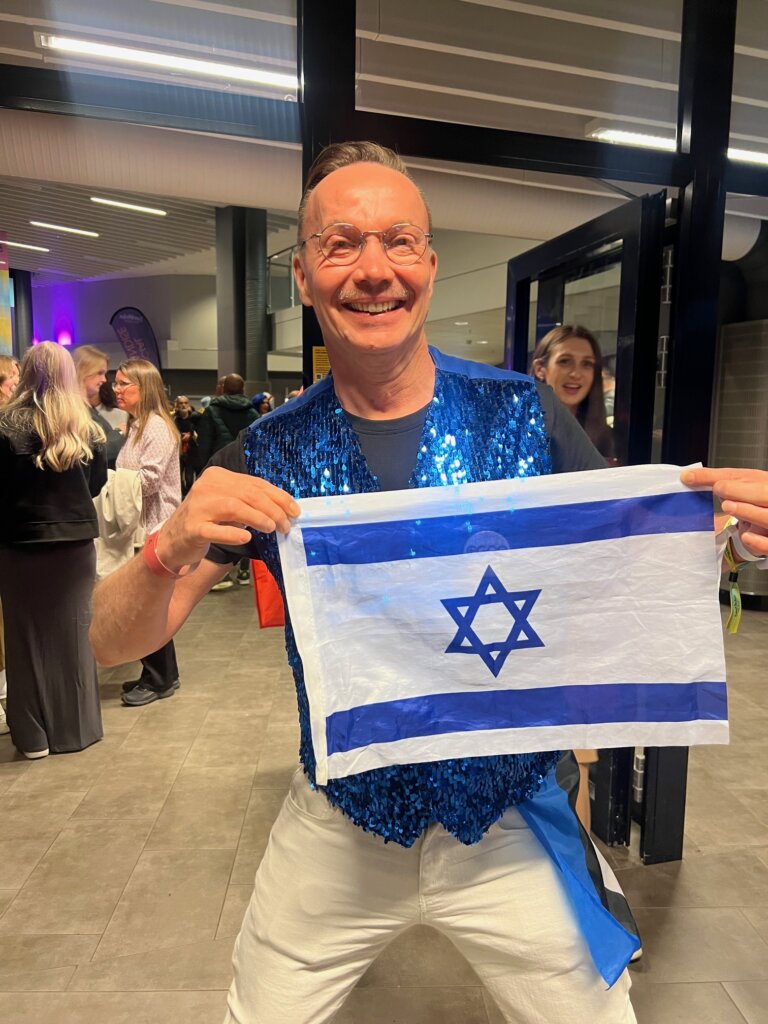Sing like no one is protesting — how Eden Golan triumphed on the world’s biggest stage
At the Malmö Arena, Israel’s Eurovision contestant shows the world the one reason she’s here

Eden Golan of Israel celebrated during a Thursday press conference after qualifying for the Eurovision Song Contest Grand Final. Photo by Jessica Gow/TT News Agency/AFP/Sweden OUT/Getty Images
MALMÖ, Sweden — Kurt Krickler, 65, is not Jewish, and has no personal connection to Israel. And yet, on Thursday night, he stood in line to enter Malmö Arena for the second semifinal of the Eurovision Song Contest draped in an Israeli flag.
“It’s just a solidarity thing,” said Krickler. “It was the only reason why I came here.” Krickler, who lives in Vienna, decided to come to Eurovision only last week, “because of all this aggressive attitude toward Israeli participation here.”
“This is not acceptable,” Krickler said. “So I thought: Why not go?”
The aggressive attitude Krickler noted was on display through Malmö for much of Thursday, starting with a pro-Palestinian protest that wound through the city in the late afternoon. Demonstrators set off green and red flares (for the Palestinian flag), and waved signs and banners: “Glitter doesn’t hide genocide,” “14,000 Dead Children,” “Israel Ut Ur Eurovision” — “Israel out of Eurovision.”
Klaus Goldschmidt, wearing a kaffiyeh and a crocheted watermelon pinned to his jacket, marched under a sign proclaiming “Jews Against Genocide,” while a few men next to him carried another reading “Jøder For et Frit Palaestina” — in Danish, “Jews for a Free Palestine.”

The group had traveled from Copenhagen, a short train ride from Malmö.
“I’m coming here today to say Israel should not participate in the Eurovision,” Goldschmidt said. “We have to do everything we can to stop what Israel is doing — the genocide in Gaza, occupation in the West Bank.”
Later, a protest broke out just outside Malmö Arena, two train stops away from where the march began. A small group of demonstrators waving Palestinian flags, shouting into megaphones and tossing Palestinian flag confetti, briefly took over the entrance to the Hyllie train station, used by thousands of fans to travel to the concert.
Roi Yechezkel, 49, wearing a white and blue faux flower garland and holding an Israeli flag, wasn’t bothered. Protesters tried to approach him and some of his Israeli friends, he said, but “the police stopped them.”
“I live in Dublin,” said one of those friends, Guy, 40, who asked to be identified by only his first name out of fears for his security. “I see this every day.”

“These guys have no idea what they’re talking about,” Hadar Eliraz, 57, said of the protesters. He is attending Eurovision for the first time with his daughter Nitsan, 29. Nitsan had carefully applied blue and white jewels, evoking the Israeli flag, to both of their faces. “So we just looked at them and, you know, kept on walking.”
A few concertgoers wore kaffiyehs. But there were more non-Israelis showcasing Israeli pride, too. Jouni Pihkakorpi, 57, wore Israeli and Estonian flags trailing out of his pockets, beneath a sequined blue vest. Pihkakorpi is Finnish, and has visited Israel five times; he said he loves Tel Aviv, and carried the flags to show support for his favorite songs in the competition — just as he would any year. Eden Golan‘s “Hurricane,” he said, is an “absurdly strong ballad. And it will go to the final, absolutely, yes.”
In the almost 13,000-seat stadium, I sat in the very last row, gazing down at a bedazzled sea of fans — some of them holding a large Israeli flag, front and center. Everyone was chatty; for a short time, I found myself in the wrong seat, and in two minutes learned about half the life story of the American-Danish girl next to me. My actual seatmate, a British chef attending their third Eurovision contest, told me that they had been caught up in the protest outside as they tried to exit the train. A friend back home in England had sent them a television clip in which they watched themselves onscreen, in a blue Eurovision T-shirt, struggling to avoid being corralled by riot police.
Two women in the row ahead turned around and shushed us: The show was starting. Golan sang third to last. Among those to perform before her: an Austrian ode to the joys of the rave; an Armenian folk-inflected paean to female independence; and an operatic Danish reminiscence about lost love. It was crisp, joyous, highly listenable — with an exception, perhaps, for the Alice in Wonderland-inspired screamo from San Marino.
Before Golan took the stage, a Turkish fan sitting near me said, confidently, that there was a plan to start yelling “Free Palestine” 10 seconds into her performance; if it happened, I didn’t hear it. Boos did break out, particularly at the end, when Golan briefly sang in Hebrew. But by and large, cheers and applause drowned them out.

Jouni Pihkakorpi, the Finn with the Israeli and Estonian flags, was right about Golan’s Eurovision fate: She became one of 10 Thursday contestants, out of 16, to qualify for Saturday night’s Grand Final. More applause met Golan at a post-show press conference — after some pointed comments by her fellow contestants.
Dons — given name Artūrs Šingirejs — the first Latvian representative to advance to the final since 2016, ended his answer to one question by saying “Every country in the world deserves to be free.” A wave of cheers and stamping took over the room; Golan, sitting at the end of a very long table behind which all the qualifying contestants were arrayed, gave a small smile before returning to a look of total stoicism.
Then, Joost Klein of the Netherlands — whose heartfelt rave rap “Europapa,” an ode to his deceased father, has made him a fan favorite — responded to a question about whether songs can truly unite a continent by saying the question would be a good one for the European Broadcasting Union, which runs Eurovision. The point — that the EBU might benefit from reconsidering the politics that allowed Israel’s controversial participation this year — was clear.
But Golan, the last contestant to take questions, had the final word. The press conference’s moderator told her she didn’t need to answer a question from a Polish writer as to whether she worried that she might have put other participants at risk by coming to Eurovision as a representative of Israel. Golan smiled, and gave a characteristically calm response.
“I think we’re all here for one reason and one reason only,” she said — to sing. Cue, from the fan media contingent, wild cheers.
For Golan and her fans, it was a late end to a night of challenges and triumph. During the show, it had rained outside. As I walked back to the train, I passed thousands of tiny Palestinian flags lying on the pavement outside the arena, trampled and wet.






















